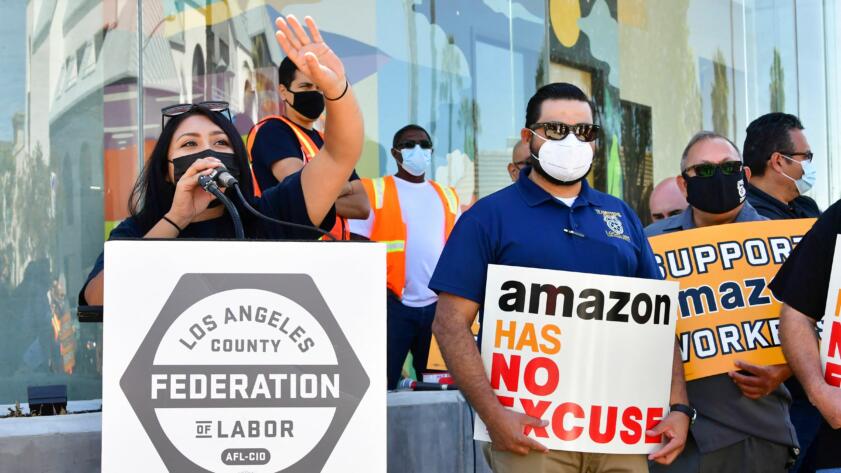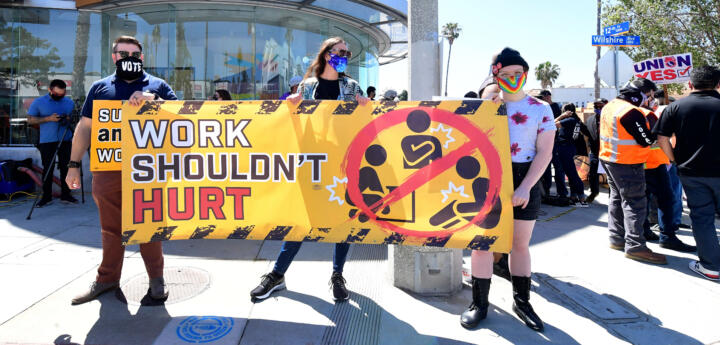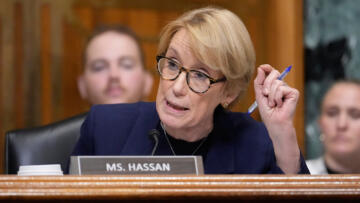Yesenia Barrera was just finishing up her 10-hour shift at an Amazon fulfillment center in Rialto, Calif., she recalled, when a manager approached her. She said he was concerned that throughout the day she’d racked up about 60 minutes of “time off task,” Amazon parlance for when someone is not directly working on the assignment at hand or taking too long to complete it. He told her he was writing her up and asked what happened, she said.
“I used the restroom today,” Barrera said she told him.
“How many times did you use it?” she remembered he asked.
“Three times,” she said she responded, thinking about how it took five minutes to walk each way across the warehouse floor to get to the bathroom.
When Barrera returned to Amazon for her next scheduled shift two days later, her badge wouldn’t let her into the building. She later learned she’d been terminated. Barrera has since become an organizer with the Warehouse Worker Resource Center, a nonprofit that advocates on behalf of warehouse workers.
The California Senate passed legislation last week that, if signed by the governor, would prohibit a spectrum of employers, including Amazon, from firing warehouse workers like Barrera for policies such as “time off task.” The bill, AB 701, would be the first law in the country to address productivity quotas and strict algometric metrics used to manage warehouse employees. (Governor Newsom’s office did not reply to a request for comment.)
Under AB 701, employers wouldn’t be able to punish workers for failing to meet quotas when health and safety issues come into play, such as a worker’s need to take bathroom and water breaks. And it would prohibit retaliation against workers who complain. The law would also require companies that run warehouses to report to the government—and their own employees—the quotas and speed metrics they mandate for workers.
“Right now, it’s very secretive,” said Christian Castro, communications director for the Los Angeles County Federation of Labor, AFL-CIO, which sponsored the bill. “E-commerce has been growing exponentially, it’s gotten even more popular during the pandemic…. Workers are telling us about an increase in quotas, not even knowing their quotas.”
Workers are telling us about an increase in quotas, not even knowing their quotas.
Christian Castro, LA County Federation of Labor
Amazon spokesperson Rachael Lighty declined to comment on AB 701 and Barrera’s allegations but said in an email, “The health and safety of our employees is our number one priority—and has been since day one,” adding, “We’re committed to giving our employees the resources they need to be successful, creating time for regular breaks and a comfortable pace.”
In opposition to AB 701 is a coalition of about two dozen business groups, including the California Chamber of Commerce, California Farm Bureau, and California Retailers Association. They say the law could raise costs for companies that run warehouses and effectively drive employers from the state.
AB 701 is “burdensome and needlessly overbroad,” Steve McCarthy, vice president of public policy for the California Retailers Association, wrote in an Aug. 30 letter to all state senators. He said the bill could lead to increased litigation “by establishing potentially open-ended employee access to bathroom facilities which will make employers’ ability to enforce production standards even more complex.”
AB 701 would cover all warehouse distribution centers, such as those run by Walmart, Target, and UPS, but the bill’s supporters say Amazon is the main target. The company, they say, is leading the charge to automate workforces, increase the speed of work, and use surveillance technologies to monitor worker productivity.
Advocates who support the bill say they hope it will cause a ripple effect to other states. They say California’s labor laws have often served as a model for policymakers and worker organizations nationwide.
“Chart Topping” Injury Rates
Amazon is the largest private employer in California, with more than 150,000 employees in the state, and the second largest employer in the U.S. Over the years, several Californian cities have welcomed the influx of warehouses, which they say have brought in thousands of well-paying jobs to regions historically plagued by unemployment.
But it’s been well documented that warehouse work can be dangerous. Several studies point to injury rates that exceed those of other industries.
150,000+
Number of Amazon employees in California
Source: Amazon
The U.S. Bureau of Labor Statistics cites data that shows warehouse workers are injured nearly twice as often as other workers in the private sector. And when employers, like Amazon, add in productivity quotas, those injuries tend to increase, other studies show. A December 2019 report by the Athena coalition looked at data and internal documents that Amazon provided to OSHA and found the injury rate at the company’s warehouses was nearly three times the combined rate of all other private employers that submitted data to OSHA.
“Primed for Pain,” a report by a coalition of four labor unions called the Strategic Organizing Center, found that not only are injury rates higher at Amazon warehouses, but the injuries also tend to be more severe—with a “serious injury rate” nearly 80 percent higher than that of all other employers in the warehousing industry.
“The rate of injuries at Amazon is astronomical…. It’s chart topping by all measures,” said Irene Tung, senior researcher at the workers’ rights group National Employment Law Project, who co-wrote a report about injury and churn rate at Amazon’s California warehouses. “I don’t think people understand just how different Amazon is as an employer and how they’re ushering in this new paradigm.”
The rate of injuries at Amazon is astronomical.
Irene Tung, National Employment Law Project
When asked about injury rates at Amazon’s warehouses, spokesperson Lighty said the company has more than 6,200 “safety professionals” throughout its facilities. “We also invest billions of dollars in new operations safety measures, technologies and other innovative solutions that protect our employees, work closely with health and safety experts and scientists, conduct thousands of safety inspections each day in our buildings, and have made hundreds of changes as a result of employee feedback on how we can improve their well-being at work,” she said.
Lighty added that the data on musculoskeletal injuries, such as sprains, strained muscles, and torn ligaments, at Amazon’s warehouses “is skewed.” She said that’s because the company’s workforce has many people in the 18 to 24 age range, which she said is more likely than other age groups to claim work-related musculoskeletal injuries.
In April, Amazon’s executive chairman and former CEO Jeff Bezos called the company “Earth’s Best Employer and Earth’s Safest Place to Work.”
Along with injuries, Amazon has also been accused of not allowing workers enough time for bathroom breaks. In a 2020 letter to Bezos, a group of 15 U.S. senators wrote, “Pressure to meet their quotas is so great that workers report urinating in plastic bottles on the warehouse floor.” Amazon responded, saying workers are “allowed and encouraged to take breaks as needed.”
Last December, Amazon settled a class-action lawsuit in California brought by 27 warehouse workers who said the company violated the state’s labor codes by denying them adequate bathroom and rest breaks. Amazon’s “production clock does not stop when employees need to use the restroom facilities,” the lawsuit said, which meant workers “have been forced to forego bathroom breaks completely, simply out of fear of termination.”
Lighty declined to comment on the lawsuit or settlement.
While California law mandates that employers must allow breaks, warehouses with production quotas can make it difficult for workers to use the bathroom while still being able to meet their tasks. Assemblywoman Lorena Gonzalez, AB 701’s author, said the bill aims to strengthen state law by creating standards around these quota systems.
“To make next-day delivery possible, corporations like Amazon have forced warehouse employees to work faster, service more customers with more orders in record amounts of time, and risk their own bodies in the process,” Gonzalez said in a statement. “No worker should be forced to sacrifice their basic human needs, or accept such undignified conditions for a paycheck.”
When Barrera was working at Amazon’s Rialto warehouse, one of her jobs was scanning boxes on a conveyor belt.
“The conveyor doesn’t stop,” she said. “Time is against you.”
She remembers at one point, she fell behind and boxes started piling up. She set down her scan gun to move some boxes aside, and it got buried in the pile. She said when she tried to pry it free, she pulled too hard, and it bounced back and smacked her in the eye. She said she went to the onsite clinic, where she was given ibuprofen and told to hold a wet paper towel on her eye. Barrera said she asked to sit down, and after about five minutes, both her manager and the clinic medic said she should be good to go back to work.
“You’re being tracked the moment you clock in,” Barrera said. “Unrealistic quotas are why workers are getting injured.”
Amazon’s Lighty did not respond when asked about the incident.
Protecting Workers vs. Increasing Bureaucracy
AB 701 has two major components: creating more transparency around work quotas and banning policies that negatively affect worker health and safety, including “time off task” policies.
For the transparency piece, employers that run warehouse distribution centers would be compelled to tell government agencies the quotas and speed metrics they require of employees and also disclose that information to workers.
This kind of speed-up on workers is breaking their bodies and churning them out.
Tim Shadix, Warehouse Worker Resource Center
“This policy provides the tools that are needed to keep workers safe in a growing industry plagued with widespread injuries and labor violations,” said Ron Herrera, president of the Los Angeles County Federation of Labor and secretary treasurer of Teamsters Local 396, both of which are sponsors of AB 701.
Tim Shadix, legal director of the Warehouse Worker Resource Center, which also sponsored AB 701, said they’ve been working on this type of legislation for the past two years. Last year, a similar bill stalled on the senate floor.
“This kind of speed-up on workers is breaking their bodies and churning them out,” Shadix said. “It undermines the argument that these are good stable jobs.”
While AB 701 would require transparency from companies around quotas, it would not create specific rules on worker surveillance and metrics.
Several Republican lawmakers in California have opposed AB 701, saying it would lead to more lawsuits, higher prices for consumer goods, and that the bill is part of an organized labor strategy to unionize warehouses.
“This bill is sponsored by union leaders as part of a campaign to tip the scales to coerce employees to unionize,” Sen. Brian Jones said in an email, adding that he doesn’t have confidence in Democratic legislators to run the state efficiently. “So now we’re supposed to trust them to micro-manage private warehouses throughout the state? No thanks.”
Jones is one of 11 senators who voted no on AB 701 (26 voted yes, and three had no vote recorded).
At least four senators, including Jones, received campaign donations of $2,500 from Amazon, according to public records from the California secretary of state. Amazon also made payments of $2,500 and $4,900 to various state assembly members, including to nearly half of those who voted no on the bill in May. The company additionally made several donations to senators and assembly members who voted yes (though not to any authors or co-authors of the bill).
When asked about the donations, Jones’s chief of staff, Craig Wilson, said, “Campaign contributions are irrelevant when it comes to how Senator Jones votes on legislation.”
Amazon has hired at least four lobbying firms in California during this year’s legislative session, according to the public records. For comparison, in 2019 and 2020, it hired just two firms per year. And the company spent more than $425,000 on lobbying in the state from January to June. More recent lobbying expenditures aren’t yet publicly available. Amazon’s Lighty didn’t respond to questions about the company’s lobbying activity.
While Amazon hasn’t publicly commented on AB 701, the coalition of business organizations and its members, including the California Retailers Association and California Chamber of Commerce, have spoken out against the bill.
Initially, the California Chamber of Commerce listed AB 701 on its “job killer” list—a label that often leads to dead bills—but then removed it in July after certain provisions around litigation and regulations were amended. The chamber still opposes the bill, however. When asked for comment, spokesperson Denise Davis referred The Markup to the letter McCarthy sent to state senators on behalf of the business coalition.
This bill “establishes anti-retaliation provisions that will make it more costly and difficult to take job actions against underperforming employees,” McCarthy wrote in the letter. He added that AB 701 could “have a chilling effect on production at distribution centers that will ripple through the rest of the supply chain.”
Amazon is on the California Retailers Association’s board of directors. McCarthy didn’t respond to a request for comment.
If AB 701 is signed by California governor Gavin Newsom, it would be slated to go into effect on Jan. 1, 2022. Newsom faces a recall election on Tuesday, but regardless of the outcome, he will determine the bill’s fate. Should Newsom lose Tuesday’s recall election, he would have 38 days to sign or veto all pending legislation before leaving office, according to California law.






